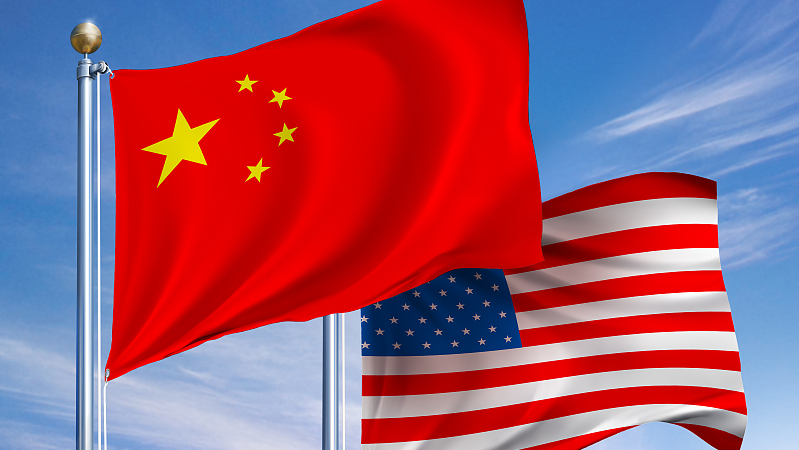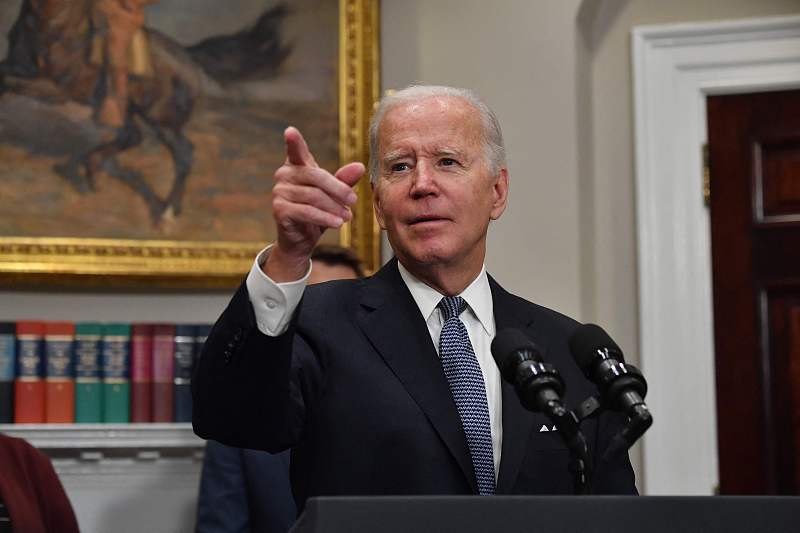
Editor's note: Hafijur Rahman is a columnist and Security and Strategic analyst, working in a prominent Strategic Studies Center in Bangladesh. The article reflects the author's opinions and not necessarily the views of CGTN.
While acknowledging that "the world is struggling to cope with the effects of shared challenges," including climate change, terrorism, new pandemics and food security, the Biden administration insists on pushing its recently unveiled U.S. National Security Strategy (NSS) by "building the strongest and broadest coalition of nations to enhance collective capacity to solve these challenges." Regarding "international co-operation under the age of competition," the NSS document claims to "work with any country, including [U.S.] competitors, but only if its competitors are "willing to constructively address shared challenges within the rules-based international order."
One could find such a strategic outline toward broader co-operation convincing and well-judged. But upon closer inspection, the document and an appraisal of Washington's actions on the grounds would demonstrate this very strategic insistence is self-contradictory.
From the beginning of his presidency, Biden has sought to introduce a doctrine that is his very own. He has taken aim at his newly released NSS to do so but only in vain. Biden has embraced a two-pronged approach regarding the U.S. competitors – simultaneously co-operating and competing with them – while dealing with the aforementioned transnational challenges. Now the question remains whether effective co-operation can be attainable under a competitive strategic atmosphere. The answer depends on two variables: How the respective competitors perceive competition between or among them and under which rules the co-operation is conditioned.
Competition is a common aspect of international affairs. But Washington perceives its strategic competition particularly with China as hyper-confrontational and set on a zero-sum calculus. The U.S. foreign policy establishment has long been described as a cold war, deeming China's rise on the world stage as an "existential threat" to American security and primacy. Washington's policy circles seek to contain China on all possible fronts.

U.S. President Joe Biden. /CFP
U.S. President Joe Biden. /CFP
The U.S.'s policies toward China have become so hostile that it has squeezed out the minimum coexisting room, and much less co-operation, required to tackle those shared global challenges. How can meaningful co-operation be possible under such a belligerent form of strategic competition where one party remains dead-set on undermining the world's second-largest economy? The answer falls beyond one's cognition.
Biden's NSS pronounces that the U.S. "will avoid the temptation to view the world solely through a competitive lens, and engage countries on their own terms." How does Washington rein in such a temptation while pursuing its geostrategic competition with China under a "great power competition framework" that limits self-restraint and strategic readjustments?
Even its apparent generous initiatives including the Partnership for Global Infrastructure and Investment or the recent Pacific Partnership Strategy are intended to counter China's Belt and Road Initiative or its Pacific outreach other than delivering on their stated goals. Furthermore, the growing reactionary trends in U.S. foreign policy and intransigence in reasserting its hegemonic leadership also showing its very intent that it would engage with competitors only on their own terms.
The U.S. vision of "building the strongest and broadest coalition of nations" to tackle those transnational crises also rings hollow, given both the implicit and explicit purposes of its recent "coalition building spree." Over the past several years, Washington has ramped up its efforts to build coalitions – like the Quad, AUKUS, IPEF, CHIP 4, and so forth. But those are aimed at building geopolitical blocs against China rather than at kick-starting a collaborative platform with China to face challenges the world is undergoing, such as the pandemic recovery, debt distress and climate change.
Additionally, Biden has introduced his objective to forge co-operation with the U.S. competitors who are willing to work "within the rules-based international order." But what kind of rules-based international order? Well, one that represents the so-called American righteousness. The NSS declares that the U.S. must "proactively shape the international order in line with our interests and values." It is ridiculous and preposterous when the U.S. wants to build a "strongest and broadest coalition of nations" while remaining set on wield its hegemony.
So, what's the way out? Is it possible to forge co-operation in the age of competition? Yes, but that depends on the U.S.'s rational appreciation of the potential catastrophe its current foreign policy posture poses to China.
(If you want to contribute and have specific expertise, please contact us at opinions@cgtn.com. Follow @thouse_opinions on Twitter to discover the latest commentaries in the CGTN Opinion Section.)